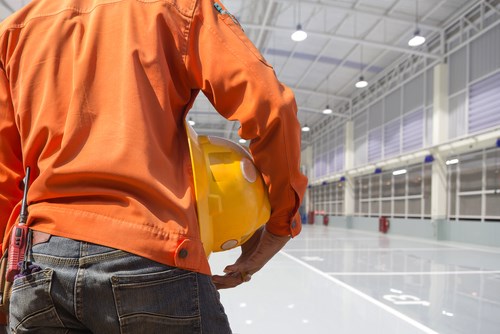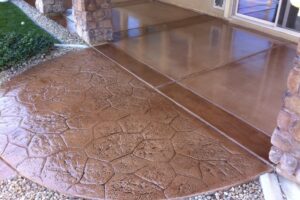Industrial epoxy flooring has emerged as a top choice for facilities requiring durable, resilient, and easy-to-maintain flooring solutions. Known for its strength, longevity, and versatility, epoxy flooring is used widely in manufacturing plants, warehouses, and other high-demand industrial spaces. This guide delves into the core advantages of industrial epoxy flooring, explores the installation process, and examines costs to help you make an informed decision about this robust flooring solution for your facility.
Benefits of Industrial Epoxy Flooring
Industrial epoxy flooring offers a unique combination of durability and practicality, making it an ideal solution for a range of heavy-duty environments. Its benefits extend beyond strength and endurance, offering advantages that support the operational efficiency and safety of industrial facilities.
- Exceptional Durability
Epoxy flooring is renowned for its resilience under demanding conditions. Once applied, the epoxy forms a thick, hard coating that can withstand heavy machinery, constant foot traffic, and even the impact of dropped tools without cracking or peeling. Its high tolerance for stress makes it particularly suitable for high-traffic areas like manufacturing floors and storage facilities. - Chemical Resistance
In industrial settings where chemical spills are common, epoxy’s resistance to a wide range of substances—such as oils, solvents, and acids—is invaluable. This protection prevents staining and degradation of the flooring, preserving both its appearance and functionality over time. - Easy Maintenance and Cleaning
The seamless surface of epoxy flooring makes it incredibly easy to clean and maintain. Dirt, dust, and spills can be swiftly removed without seeping into cracks or crevices. This easy maintenance reduces downtime, allowing facilities to maintain cleanliness with minimal disruption to operations. - Enhanced Safety Features
Industrial epoxy flooring can be customized to include anti-slip additives, ensuring safer surfaces in areas prone to moisture or oil spills. Additionally, epoxy coatings reflect light effectively, which can improve visibility and create a brighter, safer working environment, reducing the need for extra lighting. - Aesthetic Versatility
Epoxy coatings offer various colors, patterns, and finishes, enabling facilities to enhance aesthetics without compromising on performance. Color-coded sections can be used to designate zones within a workspace, improving organization and contributing to a visually appealing facility.
Industrial Epoxy Flooring Installation Process
The installation of industrial epoxy flooring is a multi-step process requiring precision and expertise to ensure optimal performance. While it may vary depending on specific facility needs, the typical installation follows these general steps:
- Surface Preparation
Proper surface preparation is essential for epoxy to bond effectively to the floor. This step involves cleaning, grinding, and possibly repairing any imperfections in the concrete substrate. The floor must be free from grease, oil, dust, and any previous coatings to achieve the best results. A clean, roughened surface ensures that the epoxy adheres firmly, maximizing durability. - Priming the Surface
After the substrate is prepared, a primer is applied. Priming improves the adhesion of the epoxy coating to the concrete, acting as a foundational layer that enhances the strength of the final product. Some primers are formulated to resist moisture, further protecting the substrate from potential water damage. - Application of Epoxy Coats
Once the primer has dried, the first coat of epoxy is applied. Depending on the project requirements, multiple layers may be added to increase the coating’s thickness and durability. Each coat must dry before the next layer is added, creating a thick, cohesive layer that resists impact and wear. - Finishing Touches and Additives
For enhanced functionality, the final coat can include additional elements such as anti-slip agents, UV protection, or decorative flakes. These additions customize the floor’s finish, either to enhance safety or to achieve a specific look. Once the final coat is applied, the epoxy is left to cure fully, a process that can take several days depending on environmental conditions.
Costs of Industrial Epoxy Flooring
The cost of industrial epoxy flooring varies based on factors such as the size of the area, the type of epoxy used, surface preparation needs, and any additional finishes or additives. Generally, industrial epoxy flooring costs range from $3 to $12 per square foot.
Factors Influencing Cost:
- Epoxy Quality – Higher-grade epoxies that are more resistant to chemicals and impact tend to be more expensive but offer greater longevity, making them a cost-effective choice for heavy-duty facilities.
- Surface Preparation – Floors with pre-existing damage, stains, or coatings require more preparation, which can increase costs.
- Special Additives – Anti-slip coatings, UV protection, or decorative elements can enhance the functionality and appearance of the floor but may add to the overall expense.
- Labor and Installation Complexity – Experienced contractors typically charge more for specialized installations, especially if the project involves complex designs or additional layers for extra durability.
While industrial epoxy flooring requires a significant initial investment, its long-term durability and low maintenance costs make it a financially sound choice for businesses focused on efficiency and longevity.
Choosing the Best Industrial Epoxy Flooring Contractor
Selecting the right contractor is crucial to ensure the success of your epoxy flooring project. An experienced contractor brings the expertise necessary to handle the intricacies of installation, ensuring that the final product meets both quality standards and specific facility needs.
- Look for Industry Experience
Contractors with a history of working in industrial settings are familiar with the challenges unique to these environments. They understand the demands of heavy machinery, frequent spills, and high traffic, and can recommend the best epoxy formulation and application methods for your needs. - Verify Licenses and Insurance
Ensure that the contractor is licensed and insured. This guarantees compliance with local regulations and protects you from liability should any damage or accidents occur during installation. - Review Previous Projects
Examining a contractor’s portfolio provides insight into their capabilities and workmanship. Look for examples of similar projects within industrial facilities to ensure that the contractor can meet your requirements. - Obtain a Detailed Quote
Ask for a detailed quote that itemizes costs for materials, labor, and any additional services. Transparent pricing helps you understand what you’re paying for and can help you compare options across contractors. - Ask About Warranty Options
Reputable contractors often offer warranties on their work. A warranty provides peace of mind, assuring you that any potential issues with the installation will be addressed promptly, maintaining the quality and longevity of the floor.
Frequently Asked Questions (FAQs)
What are the benefits of industrial epoxy flooring?
Industrial epoxy flooring offers benefits such as exceptional durability, chemical resistance, low maintenance, enhanced safety features, and customizable aesthetic options. It’s a versatile choice that supports operational efficiency and protects facility floors from wear and damage.
How much does industrial epoxy flooring cost, and what factors affect the price?
Industrial epoxy flooring costs typically range from $3 to $12 per square foot. Factors influencing cost include epoxy quality, surface preparation, additives, and installation complexity.
How do I choose the best industrial epoxy flooring contractor?
Select a contractor with relevant industry experience, licensing, insurance, and a proven track record. Obtaining a detailed quote and reviewing warranty options can help ensure you choose a reliable contractor.
Can industrial epoxy flooring withstand heavy machinery and foot traffic?
Yes, industrial epoxy flooring is specifically designed to handle heavy machinery, high foot traffic, and frequent wear and tear. Its robust, impact-resistant surface is ideal for demanding industrial environments.
What is the difference between industrial epoxy flooring and other types of commercial flooring?
Industrial epoxy flooring is formulated to meet the rigorous demands of industrial facilities, offering greater chemical resistance, durability, and customization options than standard commercial flooring.







Leave a Reply
Your email is safe with us.